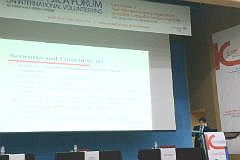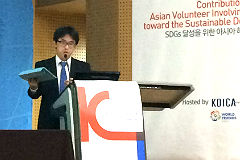Research Outcome of 'An Interdisciplinary Study of Japan Overseas Cooperation Volunteers,' Presented at the KOICA-JICA Forum on International Volunteering
2016.08.31
In an effort to discuss contributions to the Sustainable Development Goals (SDGs) by Asian volunteer organizations, the "1st KOICA-JICA Forum on International Volunteering" was held on July 1, 2016, in Seoul, Korea. JICA-RI Visiting Fellow Yasunobu Okabe (professor at Tohoku University) participated in the Forum to present the research outcomes of "An Interdisciplinary Study of Japan Overseas Cooperation Volunteers [JOCV]" as the lead researcher of the project.
At the "International Forum for Volunteering in Development" held in Tokyo in October 2015, "The Tokyo Call to Action" was agreed upon. In this Call, international volunteer groups agreed to coordinate their efforts to achieve the SDGs. This forum was jointly sponsored by the Korea International Cooperation Agency (KOICA) and JICA, and its objectives included promoting "The Tokyo Call to Action," sharing knowledge among volunteer organizations in the Asian region, and conveying messages. Aside from the members of KOICA and JICA, approximately 150 people participated in the Forum - from such organizations as the United Nations Volunteer Program; governmental organizations from the Philippines, Laos, Thailand, Myanmar and Nepal; the Chinese volunteer dispatch group "Beijing Volunteer Service Federation;" and NGOs from Korea.

1st KOICA-JICA Forum on International Volunteering
Okabe took the stage at the session "Building the body of knowledge for impactful volunteering," one of the four sessions, and discussed the impact of volunteer activities on development and how to evaluate and support these efforts.
In evaluating volunteer activities, he mentioned it would be critical to measure what, how, and to what extent the volunteers bring changes to local people, organizations or society in terms of capacity development and social capital. He also discussed the research project "Japan Overseas Cooperation Volunteers and Capacity Development," conducted by JICA-RI Senior Research Advisor Akio Hosono, as an example of volunteers working as catalysts for the capacity development of local people. Also, he introduced the case studies of JICA expert Naoko Ueda regarding a vaccination program in Bangladesh and Chagas disease control in Honduras by JOCVs, explaining changes in social capital.

JICA-RI Visiting Fellow Yasunobu Okabe
Furthermore, Okabe stated that it is essential for volunteer activities to have the support of project implementing organizations. Along with this, he introduced the research outcomes of the following two cases: a) "Making Efforts to Work, Not Being Discouraged by Obstacles" by JICA-RI researchers Mine Sato (associate professor at Yokohama National University) and Mika Ueyama (associate professor at Ryukoku University) and b) "Role of Volunteer Coordinators and Country Offices" by Koji Yamada (chief representative of the JICA Bhutan office). Based on these cases, Okabe concluded that project implementing organizations can provide such support as offering expertise and practical advice, planning joint study meetings, and arranging the creation of an environment for networking among volunteers.
In addition, this session offered a presentation on the management, monitoring and evaluation of volunteer activities based on the results from KOICA, allowing the participants to verify the importance of evidence-based research. The forum closed with the JICA vice-president Kae Yanagisawa, confirming the significance of mutual interaction between volunteers and the local community.

事業事前評価表(地球規模課題対応国際科学技術協力(SATREPS)).国際協力機構 地球環境部 . 防災第一チーム. 1.案件名.国 名: フィリピン共和国.

事業事前評価表(地球規模課題対応国際科学技術協力(SATREPS)).国際協力機構 地球環境部 . 防災第一チーム. 1.案件名.国 名: フィリピン共和国.

事業事前評価表(地球規模課題対応国際科学技術協力(SATREPS)).国際協力機構 地球環境部 . 防災第一チーム. 1.案件名.国 名: フィリピン共和国.

事業事前評価表(地球規模課題対応国際科学技術協力(SATREPS)).国際協力機構 地球環境部 . 防災第一チーム. 1.案件名.国 名: フィリピン共和国.

事業事前評価表(地球規模課題対応国際科学技術協力(SATREPS)).国際協力機構 地球環境部 . 防災第一チーム. 1.案件名.国 名: フィリピン共和国.
scroll